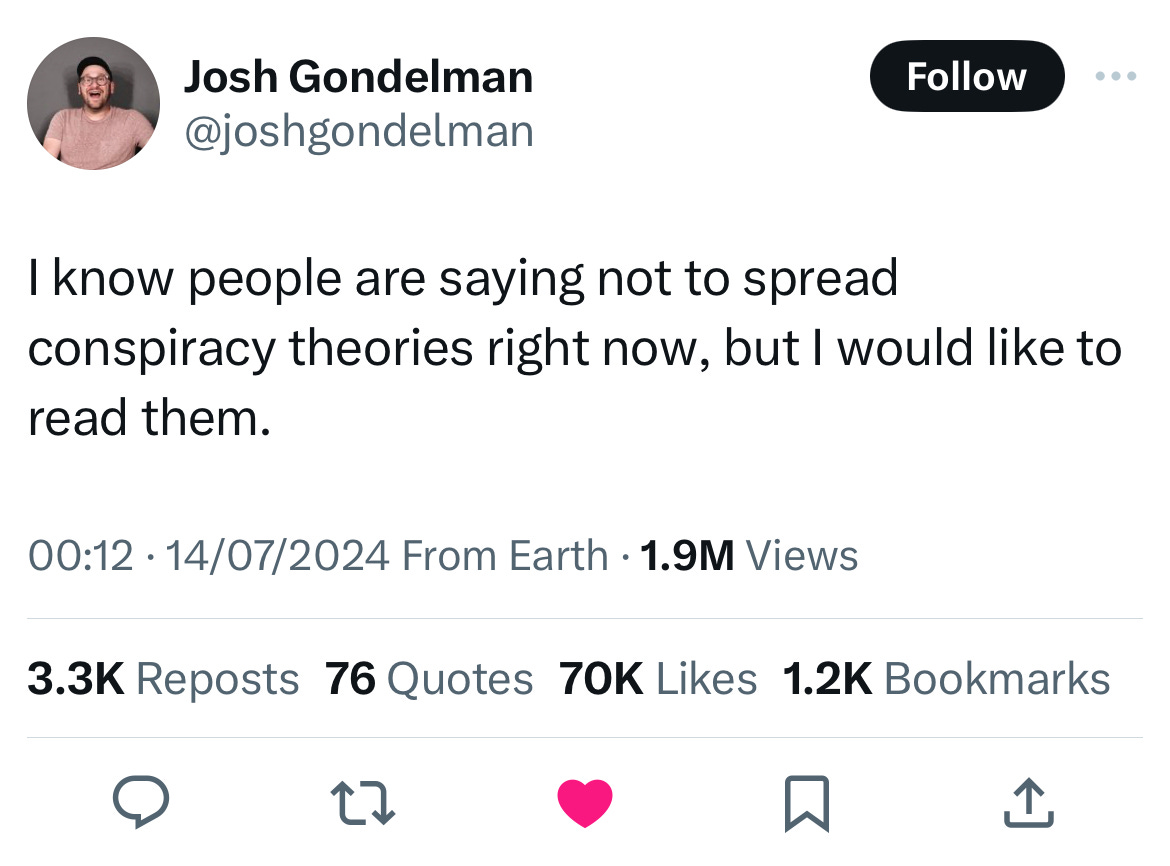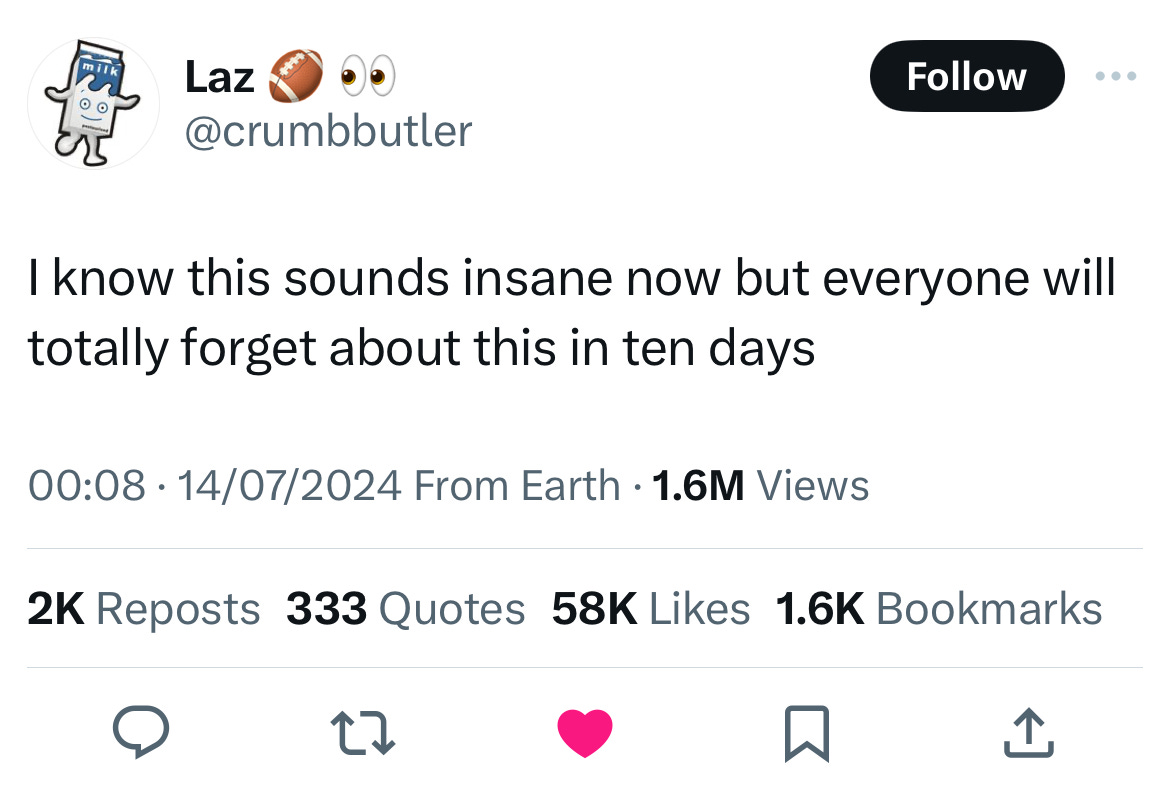Hello hotties!
This week we’re digging into…
Why your past mistakes are “blindness”
A Hawk Tuah Girl update (she’s making bank)
What the attempted assassination attempt on Donald Trump tells us about the state of social media and America (not good)
The new queen of tennis who’s playing a very different game
How Sambas and a little red bag went from catchy to cringe in record time
The Gen Z gender divide over… politics (with lots of fancy graphs)
How gaming made us main characters who sidequest then tell our stories from our POV (don’t worry I’ll explain)
Let’s get into it…
1. Language lesson: Blindness
Young women are taking to TikTok to commemorate their make-up mistakes by branding it “blindness” and as a result gifting us a new expression.
It stared with eyebrow blindness and was quickly followed by blush blindness, highlighter blindness and money piece blindness. All the regrets are showcased in videos that start with a creator’s current look before revealing what they were previously ‘blind to’ as a slow-tempo version of Gnarls Barkley’s Crazy provides the soundtrack.
The trend has captured imaginations so much that eyebrow and blush blindness were breakout searches in Google Trends’ beauty report for June. Now blindness is being used to cover any situation that’s seen in a new light. Time to air out those regrets guys. I’ll go first and admit to some major fringe blindness in my twenties…
2. Conspiracies are king
The attempted assassination of Donald Trump confirmed a few uncomfortable truths, and when it comes to our online information ecosystem we learned that there’s barely any obstacles in the way of the publication and amplification of wild conspiracy theories.
Twitter/X was the stand-out hotspot for evidence-free claims and provable lies, and in the aftermath of the attack it showed the consequences of killing off trust and safety teams on a platform.
It also demonstrated just how much consumers lap up conspiracies. The reason they’re so ubiquitous, and pushed into so many feeds, is because they’re extremely engaging. Writer Josh Gondelman put it brilliantly…
Secondly the response to the attack demonstrated yet again the collective amnesia America suffers from when it comes to political violence. The same memory loss also applies to the U.S. comprehending the consequences of a society that has more guns than people. Moments after the shooting, President Biden said: "The idea that there's political violence or violence in America like this, is just unheard of, it’s just not appropriate."
To say it’s “unheard” of is plain wrong and brushes over attacks on Nancy Pelosi’s husband, Steve Scalise, Gabby Giffords and frankly, the history of the USA. Not to mention the 18,854 who died from gun violence in America last year.
And finally so much mainstream media coverage has centred on how the Trump shooting may affect the November election with many musing that it will help his campaign. But my point above applies here too. Sometimes we forget how quickly we forget as this Twitter/X creator puts perfectly…
3. Game, Set, Match, Miss Riddle
One of the biggest stars to emerge from Wimbledon this year didn’t hit a ball, instead she made her name by serving up high fashion looks and slices of her life as a tennis “WAG”. I’m talking about Morgan Riddle, the content creator turned “tennis Barbie” whose profile is blowing up and may soon eclipse that of her tennis player boyfriend Taylor Fritz.
The 26-year-old American has built a following of nearly a million across TikTok, Instagram and YouTube by sharing what life is like on the tour as a player’s partner, showcasing her tenniscore style and creating explainers to help novice tennis fans understand the game.
Her fashion chops and presenting skills have earned her a recurring role as the host of Wimbledon Threads where she interviews attendees about their fits and goes behind the scenes at the All England Club. She’s even become the first non-athlete to be sponsored by Wilson. Riddle may not have played a match but she’s certainly winning.
4. For Gen Z, politics is a battle of the sexes
Young people’s political views are increasingly split down gender lines and the recent election in the U.K. shows just how acute the divide is.
The Gen Z gender gap started taking shape following the #MeToo movement in 2017 and has resulted in young women leaning towards progressive causes while young men pull right. The divergence is unique to Gen Z and not seen in older age groups.
The phenomenon has led to starkly different voting patterns. Data from YouGov shows that almost twice as many 18 to 24-year-old women voted for the left-leaning Green Party than men of the same age (23 per cent to 12 per cent) in the U.K.’s recent general election.
On the other side of the ideological spectrum men aged 18 to 24 were much more likely to vote for right wing parties with 12 per cent voting Reform, compared to six per cent of women the same age. Similarly 10 per cent of young men voted Conservative, while just six per cent of young women did the same.
As this table graph shows there aren’t large proportional gaps between the genders amongst older age groups.
The Gen Z divide has been observed in countries on every continent, according to the Financial Times, and it’s particularly pronounced in America. That is most starkly demonstrated when it comes to women’s reproductive rights, with Gen Z men showing the least support for a woman’s right to choose. Just 46 per cent are in favour of abortion, far fewer than the 60 per cent of male Boomers (over 60s) who were surveyed by Ipsos.
Why does it matter?
The upcoming U.S. presidential election will likely be defined by the gender gap according to Axios. Not only are the campaigns striking very different tones - with Trump leaning into hyper masculinity, while Biden focuses on preserving women’s rights - the divergence between genders when it comes to identifying as liberal is significant. Data from Gallup shows that amongst 18 to 29 year-olds, 40 per cent of women identify as liberal, whereas just 25 per cent of men say the same.
Experts also believe that ideology gaps are growing, likely aided by culture war issues and the fragmented media ecosystem that can create separate realities for men and women. This has manifested itself in explosive gender debates like man or bear and the 4B movement, while the incel movement and Andrew Tate inspired content thrives.
Whether the gap can be bridged is to be seen, but if it keeps widening then I doubt we’re going to have much luck reversing the plummeting birth rate any time soon.
5. Lore, POV and side quests
Gaming is transforming how young people speak after a raft of terms shifted from gamer culture to the mainstream. I know you love these slang updates so let’s take a look…
Main character
Many will understand this to mean the central figure in a story but gamers use it to refer to the character they spend the most time playing. It’s since become a self-referential expression with TikTok popularising the concept of ‘being the main character of your own life’, while main character syndrome has come to mean someone who is self-centred.
In gaming it’s used to explain the the history of the universe that someone is playing in, and similarly it’s now used to describe a person’s backstory IRL.
Short for point of view it has it’s origins in gaming but is now one of the most prevalent TikTok content types where someone shows an event or experience from their perspective.
Keep reading with a 7-day free trial
Subscribe to highly flammable by Rachel Richardson to keep reading this post and get 7 days of free access to the full post archives.











